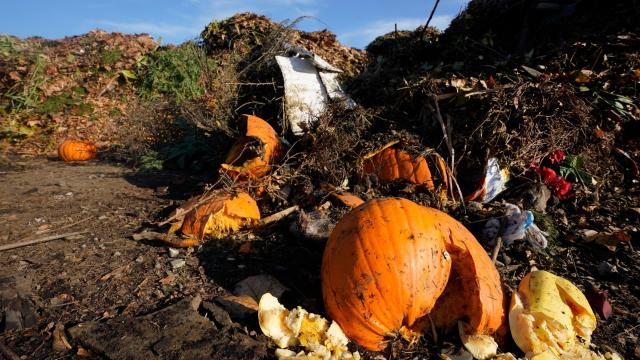California kicked off 2022 by implementing a landmark composting law. Starting this month, everyone in the state is required to start composting food scraps and other materials in an effort to slash methane emissions. It’s a big change for many cities and consumers in the U.S.’s most populated state — but a lot of hurdles remain to meet California’s lofty composting goals.
Food waste, which generates methane as it decomposes in landfills, is a big problem in California. Half of the trash that ends up entering California’s landfills is food waste and other compostable material like cardboard and yard trimmings. Subsequently, 20% of California’s methane emissions come from all this stuff decomposing in landfills.
The state’s new composting regulations aim to reduce the amount of compostable items going into landfills 75% by 2025, making it the second state in the country to pass a composting requirement. (Vermont banned compostable materials in landfills in 2020, although with just 625,000 residents, it’s a far cry away from the size of California’s proposed changes.) If the state meets its 2025 target, it would be the equivalent of taking 1.7 million cars off the road in saved emissions.
The law governing the composting regulations, SB 1383, deals with reducing short-lived climate pollutants as a whole, including methane. The mandates for composting and other initiatives set out in SB 1383 were actually passed back in 2016 under then-Gov. Jerry Brown. It went into effect to start this year, though, by mandating that cities have some sort of plan in place. Programs to deal with composting will be rolled out over the next couple of months, and cities could face fines of up to $US10,000 ($13,754) a day in the future for not properly keeping food waste out of landfills. Despite the long lead-in, many cities have applied for a waiver to give them an extension to get their programs up and running.
The law requires that composting programs be run on a jurisdictional level, meaning that rollout could be pretty uneven across the state. Some cities, like San Francisco and Berkeley, already offer curbside compost bins for kitchen waste and yard trimmings. Los Angeles is conducting pilot programs for curbside pickup in some neighbourhoods that it hopes to expand by next summer from 18,000 homes to an additional 730,000 single-family households.
Michael Martinez, the founder and executive director of the nonprofit LA Compost, said in an email that the city “has had a successful backyard compost program for several years,” runs community drop-off locations, and has been working to identify how composting across the city “could realistically happen.”
“Education will be key, and I’d imagine the rollout taking a few years, but the good news is that compost services will soon be offered to all in the city of LA,” he said.
There are some significant hurdles in the way. Building out composting infrastructure is going to be a big financial hill to climb, especially considering that SB 1383 does not provide funding to do so. Legislators gave California’s state agency that governs recycling, CalRecycle, $US170 ($234) million for composting in 2021 and 2022, $US60 ($83) million of which was distributed to cities to help them kickstart their programs. (The League of California Cities, which represents much of the nearly 500 cities in the state, had asked for a much higher $US225 ($309) million in a letter sent to the Legislature last year.)
CalRecycle estimates that more than 100 new composting facilities will need to be built around the state to meet the goals laid out in SB 1383. The cost to do that could run into the tens of billions of dollars, CalRecycle’s director Rachel Wagoner told the San Francisco Chronicle.
There’s a lot to be done — and California is already behind. The state has already missed a 2020 target set in SB 1383 to cut compost in landfills to half of what it was in 2014. Wagoner told the Chronicle that while she’s hopeful cities can get their act together, “we are not even close to that goal” of 75% waste reduction by 2025. “We are actually something like a million tons over our baseline in 2014.”
As cities get their act together, there’s still an issue of how to tell people about the change in their lifestyle, something that Martinez envisions as being one of the biggest hurdles. Composting may be easier than the byzantine recycling systems most municipalities have. Los Angeles, for example, has said that all food scraps, including meat and bones, will be compostable. That will lower the barrier to entry as the city’s program rolls out.
But Martinez said that everyday people will still need to be educated about “what can [and] can’t go in the bin per each jurisdiction and region,” and that cities will need to be “transparent with consumers as to when they can expect a bin option.” The law requires that cities must provide translations of education materials in areas where “a substantial number of residents” speak a language other than English.
Even with all the hurdles, there’s still a lot to be excited about if the U.S.’s most populated state can figure out how to compost on a large scale. “This new law is ultimately a step in the right direction and with all new things, will require time and patience to figure out,” Martinez said.
